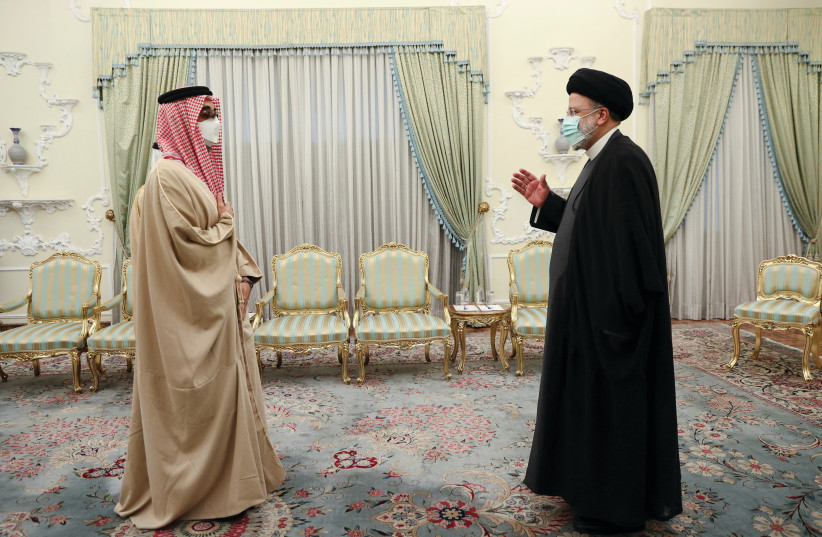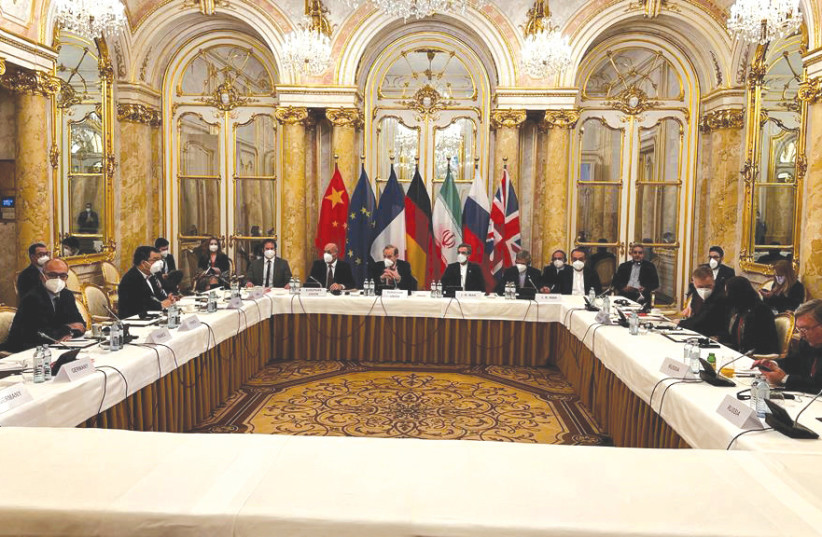The Israeli decision to push the US out of the agreement should be labeled as one of the worst strategic decisions ever made by an Israeli government.
GERSHON BASKINDECEMBER 15, 2021 21:44DECEMBER 15, 2021 21:53

Former US President Donald Trump’s withdrawal from the Joint Comprehensive Plan of Action at the prodding and pushing of former Prime Minister Benjamin Netanyahu should be marked in history books as one of the greatest failures in the history of US presidential decision-making.
The Israeli decision to push the US out of the agreement should be labeled as one of the worst strategic decisions ever made by an Israeli government. The JCPOA was far from a perfect agreement, but sticking to it would have prevented Iran from the advanced uranium enrichment program we have seen in the last several years. Iran is moving rapidly to become a “breakout state,” which would be months from actually having a nuclear weapon. Had the JCPOA still been in force, with its strict monitoring oversight, even if Iran cheated, it could not have reached the point where it is now.
There are two noteworthy points to look at: the deepest and strictest sanctions by the US and others and clandestine Israeli military attacks have not stopped Iran from moving forward on its nuclear program. Iran has had a nuclear program for decades, yet according to experts – local and international – Iran has not yet made the decision to develop a nuclear bomb. Iran’s nuclear program was launched in the 1950s under the shah with the help of the United States.
cnxps.cmd.push(function () { cnxps({ playerId: ’36af7c51-0caf-4741-9824-2c941fc6c17b’ }).render(‘4c4d856e0e6f4e3d808bbc1715e132f6’); });
In 1970, still under the shah, Iran ratified the Non-Proliferation Treaty (NPT), limiting its nuclear program to peaceful use, and making its nuclear program subject to inspection by the International Atomic Energy Agency. The West ceased its cooperation with Iran after the 1979 Iranian Revolution. At that point Iran began its covert nuclear program. In the 2000s, Iran’s uranium enrichment program raised concerns that the program might be intended for non-peaceful uses.

DELEGATIONS CONVENE for a meeting of the JCPOA Joint Commission in Vienna, yesterday. (credit: REUTERS)
The IAEA launched an investigation in 2003. In 2006, because of Iran’s noncompliance with its NPT obligations, the UN Security Council demanded that Iran suspend its enrichment programs. At that point multiple UN resolutions were passed against Iran and a regime of international sanctions was put into place.
It should also be noted that India, Pakistan and North Korea achieved nuclear weapons status in a much shorter time frame, and with regard to at least Pakistan and North Korea, it is believed that Iran has far superior capabilities and scientific know-how and technologies.
Competing with Israel’s failed strategy of encouraging the US to withdraw from the JCPOA would be an Israeli decision to launch a military attack against Iran. The strategy of withdrawal from the agreement has not yet cost Israeli lives; a military attack against Iran would undoubtedly carry an enormous price to human lives and beyond imaginable damage in property.
Rather than encouraging the US not to return to the JCPOA, the Israeli national defense establishment should be pleading with the US to complete the Vienna negotiations as fast as possible and to return to the original agreement.
After that agreement is reinstated and inspections are carried out to bring Iran back into full compliance, the US leadership, together with the EU partners and Russia and China should set on course a plan to bring Iran into the fold of the international community that would include agreements on limitations on ballistic missiles and on decreasing military support for regime militias in Lebanon, Syria, Yemen and any other place.
The West knew how to combat the Soviet Union through a multiplicity of tools including building deep awareness among the peoples under Soviet control of the great prices they were paying as a result of the regime that controlled their lives.
The Iranian people are quite aware of the costs they are paying because of the policies of the ayatollahs. The economic opportunities laid at the doorstep of an Iran that is in full compliance with the JCPOA would help to encourage democratic movements within Iran to overcome the extremists and hopefully assist in leading Iran out of the dark age of the revolution that began in 1979.
It is believed by many Iran experts that a majority of Iranians do not support the regime. One of the things that has kept the regime in power all of these years is the opposition in the West (mainly by the US and Israel) to the regime and the tactics that have been employed against the regime. There is a kind of reverse effect of unintended consequences in which the harder Iran gets hit by the US and by Israel, the stronger the regime becomes.
It is time to develop a clear and coherent regional approach to Iran. Israel shares interests with Saudi Arabic, the UAE, Bahrain, Oman and maybe even Turkey in limiting Iran’s influence in the region. In the days before the visit of Prime Minister Naftali Bennett to Abu Dhabi, Crown Prince Mohammed Bin Zayed hosted visits from the Saudis, the Syrians, the Turks and even the Iranians. Israel’s new best friends in the Gulf are perhaps the key element in developing a new policy vis-à-vis Iran.
This new policy is not based on mutual military threat, nor on capitulation but rather engagement and diplomacy. Of course, this policy is linked to Iran and the US returning to a renewed JCPOA. Israel has little to gain by continuing its dangerous threats of escalation and military attacks.
It is not only the billions of shekels that the Israeli army is going to waste in developing a military strike plan that should never take place. The risks to world security are too high and the dangers to the peoples of the entire Middle East are too vast to allow the insanity of even considering an Israeli military strike against Iran.
Rather than Israeli leaders lecturing the world about the dangers of a nuclear Iran (which are real), the leaders of the West and of our neighborhood should be lecturing the Israelis and Iranians to climb down the ladders of belligerency which may, God forbid, actually lead to the most costly and dangerous Middle East wars.
The writer is a political and social entrepreneur who has dedicated his life to the State of Israel and to peace between Israel and her neighbors. He is now directing The Holy Land Investment Bond.
Content retrieved from: https://www.jpost.com/opinion/israeli-and-iranian-failed-strategies-opinion-688849.